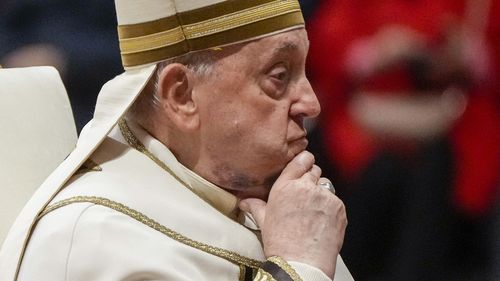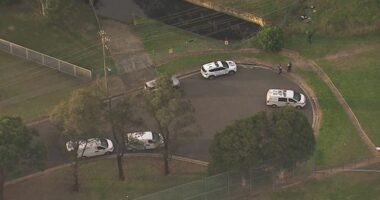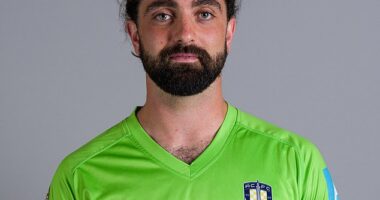In a recent update, the Vatican disclosed that Francis had not experienced any additional respiratory crises since Saturday night. However, he was still reliant on high levels of supplemental oxygen for his treatment.
Some blood tests showed “initial, mild, kidney failure,” but doctors said it was under control.

A previously prepared message for Francis to deliver on Sunday was not presented by the pontiff. The message expressed his confidence in the ongoing treatment at Gemelli Hospital and highlighted the importance of rest in his therapy. He requested prayers, as he often does, and acknowledged the upcoming anniversary of Russia’s invasion of Ukraine, describing it as “a painful and shameful occasion for the whole of humanity.”
Meanwhile, in Francis’ homeland of Argentina, Catholics gathered to pray for his recovery at the Buenos Aires cathedral. As a gesture of solidarity, the city’s iconic obelisk was illuminated with a message that read “Francis, the city prays for you.”
In Cairo, the grand imam of Al-Azhar, the seat of Sunni learning who forged a close bond with Francis, wished him well.
“I pray to Allah to grant my dear brother, Pope Francis, a swift recovery and to bless him with good health and well-being so that he may continue his journey in serving humanity,” Sheikh Ahmed al-Tayeb wrote in a Facebook post.
The American Jewish Committee also offered prayers. “We stand together with our Catholic brothers and sisters during this challenging time,” the group wrote on X.
And school children from around Rome deluged the Gemelli hospital with get-well cards, while Italian bishops led rosary prayers and celebrated special Masses across Italy.

Family refuses seat upgrade on Australia flight and walk off alive
The main threat facing the pope is sepsis
Doctors have warned that the main threat facing Francis is sepsis, a serious infection of the blood that can occur as a complication of pneumonia. To date there has been no reference to any onset of sepsis in the medical updates provided by the Vatican, including on Sunday.
On Saturday, Francis developed a low platelet count, which remained low but stable Sunday. Platelets are cell-like fragments that circulate in the blood that help form blood clots to stop bleeding or help wounds heal. Low platelet counts can be caused by a number of things, including side effects from medicines or infections.
Francis also developed anemia and, during blood transfusions Saturday, was given hematin, a treatment designed to increase the level of hemoglobin in his his blood, which in turn helps the blood carry more oxygen. Doctors reported Sunday that the therapy had been beneficial.
Francis, who has chronic lung disease and is prone to bronchitis in winter, was admitted to Gemelli hospital on February 14 after a week-long bout of bronchitis worsened.
Doctors first diagnosed the complex viral, bacterial and fungal respiratory tract infection and then the onset of pneumonia in both lungs. They prescribed “absolute rest” and a combination of cortisone and antibiotics, along with supplemental oxygen when he needs it.
Recent reforms suggest pope knew he was getting more fragile
Francis has taken several recent decisions that suggest he was well aware that he was getting old and frail.
Last year, he revised the funeral rites that will be used after he dies, simplifying the rituals to emphasise his role as a mere bishop and allowing for burial outside the Vatican in keeping with his wishes.
But the core elements of the rites remain, including the three key moments that must be observed between the death of a pope and his funeral: In his home, in St Peter’s Basilica and in the place of burial.
In December, Francis created 21 new cardinals. All but one were under age 80 and thus eligible to vote in a conclave to elect his successor. Their additions brought the overall number of voting-age cardinals to 140, well over the 120 limit set by St John Paul II. But several of the current electors are turning 80 this year, bringing the number down.
Earlier this month, once he was already sick, Francis decided to extend the five-year term of the current dean of the College of Cardinals, Cardinal Giovanni Battista Re, 91, rather than make way for someone new. As depicted in the film Conclave, the dean of the College of Cardinals plays an important role in the life of the Catholic hierarchy, and is a crucial figure during the transition between one papacy and the next.
Francis also decided to extend the term of the vice-dean, Argentine Cardinal Leonardo Sandri, 81.










